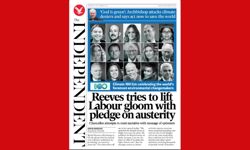As reported by the Newspaper Society: Editors have warned that agreement poses a dangerous threat to press freedom which would result in “anaemic” local newspapers and land the industry with an “expensive, debilitating” new regulatory regime through no fault of its own.
Ian Murray, editor in chief of the Southern Daily Echo, wrote this week: “For the majority of newspapers and magazines, the 1,300 or more that are not counted among the handful of national publications the new regulations are targeted towards, the decision to create a new punitive regulatory body underpinned by law is an insult. Those numbers include, of course, this paper and its sister publications in the regional press.
“We have neither hacked into phones nor deliberately set out to deceive, compromise nor vilify, and yet we will be caught in this expensive, debilitating new regime, thought up by politicians and lawyers to impress the voters, curry favour with celebrities and let themselves off the hook.
“Whether this paper and others agree to the new regulations, and as an industry we have yet to decide, or whether we stand by our own self regulation will not change the fact that the regional media has acted with common sense and fairness both before this disaster engulfed our profession and during these debates.
“We will continue to act with the best of intentions, to fight your causes and in your corner, and should we get it wrong then to apologise and act accordingly.”
The Western Morning News said: “What we will now have, as a result of this compromise, is press regulation with a very nasty sting in the tail. It is a sting that will allow politicians the opportunity, maybe not right now, but at sometime in the future, to upgrade the level of control they exert over newspapers.
“It would require a ‘super majority’ – two-thirds of both the Houses of Commons and Lords – but it would be possible. That blows a hole in 300 years of press freedom. It may be a small hole. But small holes can get bigger. If Mr Clegg and Mr Miliband think that’s a fair price to pay for making David Cameron lose face, heaven help us.”
Writing in the North West Evening Mail, columnist Anne Pickles said: “A deal has been struck by politicians who have appointed themselves puppet masters grasping the strings, however loosely, of all those whose first duty in democracy is to hold them to account.
“Perhaps things could have been worse. But that’s no comfort to local newspapers, where no phones were hacked, no police paid for information, no low friends courted in high places – but where the same brush will inevitably tar us all.”
The Northampton Chronicle said in an editorial: “The new proposals which will effect equally the smallest local weekly to the largest national daily will ultimately bring with them such horrific bureaucracy that there is a real risk that many editors will be submerged. Ultimately, anything contentious or remotely investigative will be open to such widespread challenge that our papers will be anaemic.
“Do we really want Britain to emulate the worst and most corrupt of the world’s tinpot juntas? A free press, with all its many faults, has done more to keep democracy alive than any other force.”
The Sheffield Star wrote: "The papers that will pay the price will be the trusted local press the length and breadth of Britain. Titles like this newspaper - which are already seeking to navigate through the perfect storm of digital competition, recession, and rising production costs.
"Meanwhile an unregulated social media and offshore digital media are free to publish whatever they wish - with none of the checks on accuracy, balance, or good taste that your local paper has enforced for some 150 years. And with none of its accountability either."
Eastern Daily Press editor Nigel Pickover wrote: “Just imagine a day when another government, at another time, decided that NHS reforms shouldn’t be scrutinised at all. Or that papers like the EDP shouldn’t be able to investigate our 999 service. Or hugely controversial proposals affecting mental health services here. Or that investigations into MPs expenses were out of bounds?”
The Scotsman said in an editorial piece: "There was a very distinct smell rising from Westminster last night. Sweet, thick, sugary and slightly sickly, it was the aroma of political fudge being cooked up by the main political parties over regulation of the press. For fudge is the only way to describe the compromise over the Leveson proposals.
"It is a row which most ordinary people will find baffling and there is a danger that the debate over which side won overshadows what these proposals will do – and their impact, good and bad, on both the press and the public. This newspaper has stated on several occasions that it is instinctively opposed to politicians having any say in regulating the press. Once they have been given a regulatory inch, the danger is that they would take an over-regulatory mile, with the end result a muzzled, compliant press."
The Leicester Mercury said: “Britain already has a raft of draconian laws which govern the press; a libel system heavily weighted in favour of litigants; a newly established privacy law; and a raft of reporting restrictions which make coverage of public courts increasingly problematic.
“Those who think newspapers now need statutory regulation – however remote and well-meaning that starts out as being – are in danger of taking another step along a road which will end the freedom of the press to report and investigate, fearlessly and independently, in the public interest.”
Peter Barron, editor of the Northern Echo, wrote: "We have to hope that Britain never comes to regret the sad day it allowed politicians to meddle in the workings of the press. Hopefully, it will not prevent the press from exposing scandals, like that of MPs’ expenses, or scandalous behaviour, like that of Chris Huhne, but equally it is to be hoped that it will rein in the excesses of the national newspapers which, as today’s case involving the stolen phone of MP Siobhan McDonagh showed, have felt themselves to be beyond the law and outside normal moral conventions."










